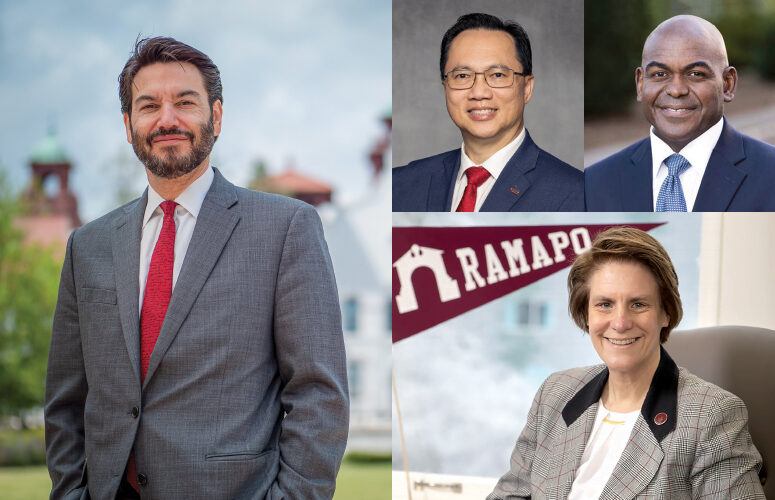
A Wave of New College Presidents
Recently installed presidents at New Jersey higher education institutions discuss their visions for their respective colleges and universities as the state, as well as the rest of the nation, has been experiencing an increased turnover rate of academic leaders.
By Anthony Birritteri, Editor-in-Chief On Feb 8, 2023Since 2020, there has been a perceptible wave of new college and university presidents taking the helm of various institutions of higher education in New Jersey. Interestingly, the trend has also been occurring nationwide.
There seems to be many reasons for these transitions. One of them could be the COVID-19 pandemic. In a Forbes article published last September, Jeffrey Harris, the founder and managing partner of Harris Search Associates, commented that many presidents who were planning “to retire or step down two or three years ago decided to stay on to see their institutions through the worst of the pandemic.” Now that the worst of COVID-19 is behind us, they have now been confident in finally stepping down.
However, the trend of resignations has been noticeable even before COVID-19. An American Council on Education report found that college presidents were serving an average of 6.5 years in their positions in 2017, compared to seven years in 2011 and 8.5 in 2006.
What could be the reason for this pre-pandemic turnover trend? Is it the pressure of the job?
In the Forbes article, Harris says: “The public scrutiny of the role of a president is certainly not diminishing. If anything, it has been expedited. You have governing boards that are more vocal. Faculty and staff that are also more vocal, [and] you have the press requesting public records more frequently – it’s a very public job.”
Taking a look at the changes in New Jersey, Eugene Lepore, executive director of the New Jersey Association of State Colleges & Universities, says that “while we have seen a number of recent leadership transitions at New Jersey’s public colleges and universities, these changes have, in nearly every case, been the result of a president’s planned retirement after a long and successful career in higher education.”
Steve Reynolds, president and CEO of the Independent Colleges and Universities of New Jersey, comments, “The recent turnover among the presidents in our sector has been relatively limited. Each of the successions at independent colleges and universities in New Jersey over the past few years have been the result of specific personal decisions made voluntarily by the outgoing leaders.”
However, commenting on the Forbes article, Reynolds says he would echo many of its points: “It’s almost as if the average tenure of college presidents these days across the US, in both the public and private sectors, has become comparable to the career of an NFL running back – and both jobs, while critical to the success of the team/institution, have become more bruising.”
Below, we present the visions of recently appointed New Jersey college and university presidents (hired between 2019 and 2022). The common threads in their respective comments are the goals of academic excellence, leadership development, entrepreneurship, service to the community, student accessibility, diversity and social mobility.
It is interesting to note that of the 14 presidents profiled, 6 are the first persons of color to lead their respective institutions. Additionally, one college hired its first woman president while three institutions hired their first male presidents.
An InsideHigherEd.com article published in February 2022 recognizes the trend in hiring from minority groups. The article reported that: “In the 18 months from June 2020 through November 2021, more than a third – 35.4% – of the president and chancellors” hired by institutions of higher education were from racial minority groups.” Based on research, a full quarter (25.3%) were Black (that figure is 22.5% when excluding historically Black colleges and universities). By comparison, just 14.6% of the campus leaders hired in the 18 months between December 2018 through May 2020 were Black, the article revealed.
New Jersey college and university presidents hired between 2019 and 2022:
Dr. Joseph E. Nyre
President, Seton Hall University
Started: August 1, 2019
Previous Role: President of Iona University President
Vision: Seton Hall stands out for its remarkable success in today’s shifting higher education landscape, which was made even more uncertain by the stressors of COVID. To avoid pandemic paralysis, we achieved exceptional goals thanks to our dynamic strategic plan, Harvest Our Treasures, and One University mindset. Together, we planted seeds that have blossomed into larger and more highly prepared freshman classes and increased scholarship support, including a record $158 million this year. Students choose Seton Hall to learn leadership at our nationally recognized Buccino Institute and to launch successful careers, which begins with a 95% job placement rate six months after graduation. Other successes include a transformational University Center renovation and more than 40 new full-time and tenure-track faculty hires in 2022.
Dr. Bruce Murphy
President, Centenary University
Started: January 1, 2020
Will retire June 30, 2023
Previous Role: Consultant, Registry for College and University Presidents, President of Nicholls State University
Dr. Jonathan Holloway
President, Rutgers University
Institution’s first Black president
Started: July 1, 2020
Previous Role: Northwestern University Provost
Vision: My vision is built on three fundamental principles that unite us at Rutgers, starting with access to academic excellence. We are committed to access for students and aspire to be a national model for outstanding academic programs, social mobility and educational equity. Toward that aim, we continue to make a Rutgers education affordable. As of this year, we now have programs on all our campuses to ensure that families with incomes below $65,000 won’t have to pay Rutgers tuition.
Second, we strive to become the ideal of a beloved community. We recognize that everyone has an important role to play in the success of the university. It also means that we recognize the inherent dignity not only within our community, but in the people we serve. In service to this goal is our new Summer Service Internship program, which is placing Rutgers students in nonprofit public service internships that expose them to worlds that are different, diverse and challenging.
The third principle is our commitment to the common good. Through the excellence of our health systems, our collaborations with local and global partners, and our scholarly research – including our newly established Institute for the Study of Global Racial Justice – Rutgers is addressing society’s biggest challenges.
Dr. Matthew Whelan
President, Caldwell University
Institution’s first male lay president
Started: July 1, 2020
Previous Role: Vice President for University Enrollment Strategy and Relationship Development at Stony Brook University
Dr. Augustine A. Boakye
President, Essex County College
Started: Nov. 1, 2020
Previous Role: Interim President at ECC
Dr. James W. Crawford III
President, Felician University
Institution’s first Black and male president
Appointed: June 25, 2021
Previous Role: Retired Admiral & 43rd Judge Advocate General (JAG) of the US Navy
Vision: Felician University is a Catholic Franciscan institution of higher learning that brings students to the fullness of human flourishing in mind, body and spirit. I am committed to ensuring broad access to a tailored, immersive education experience, within an inclusive, vibrant community of creativity and learning where everyone is respected and embraced for who they are, designed to meet the needs of the residential and commuter student. We deliver graduates with the skills and character to immediately impact the businesses and communities they serve. Our recently launched strategic plan focuses on capital projects and programming to enable every Felician Falcon to thrive in today’s fast-paced, knowledge-driven economy. Excellence in learning delivery and the learning environment underpinned by Franciscan core values guide all we do.
Dr. Gary Crosby
President, Saint Elizabeth University
Institution’s first Black and male president
Started: July 1, 2021
Previous Role: Vice President for Student Affairs at Alabama A&M University
Dr. Cindy R. Jebb
President, Ramapo College
Institution’s first female president
Started: July 6, 2021
Previous Role: Brigadier General, Professor Emerita; first woman dean of the Academic Board at the U.S. Military Academy at West Point
Vision: As the state’s preeminent public liberal arts institution, Ramapo College delivers a transformative education in a diverse community dedicated to welcoming and mentoring students who bring with them a range of lived experiences. Our shared vision for Ramapo is that we will be the national exemplar for public liberal arts higher education known for developing empathetic problem solvers, ethical change agents, and responsible leaders who make a positive impact and thrive in a changing world. To make this bold impact, we have committed unapologetically to an all-hands-on-deck strategy that prioritizes affordability, student well-being, mentorship, hands-on learning and leader development. These priorities are the engines through which, one student at a time, we drive investment in the future of our democracy, our industries and our communities.
Jonathan Koppell
President, Montclair State University
Started: August 1, 2021
Previous Role: Vice-provost for Public Service and Social Impact and Dean of the Watts College of Public Service & Community Solution at Arizona State University
Vision: My vision is that Montclair State University be known as exactly what it is: New Jersey’s premier public service university. That means teaming up with the communities we serve to help them achieve their aspirations and creating social mobility for our students.
Accomplishments since my arrival include: the Next Generation Service Corps, which gives every student the opportunity to engage in public service; our pending merger with Bloomfield College (New Jersey’s only four-year predominantly Black institution), which will provide a distinctive liberal arts experience within the larger research university; and a designation as one of only 43 institutions to be named a Fulbright Hispanic-Serving Institution Leader.
Since I arrived, we welcomed the two largest incoming classes in our history and our largest total enrollment – all while remaining one of the most affordable institutions in New Jersey, with graduation rates that exceed state and national benchmarks, especially for students of color.
Dr. Lamont O. Repollet
President, Kean University
Institution’s first Black president
Started: July 1, 2020
Previous Role: NJ Commissioner of Education
Vision: Kean University is on the rise, recently recognized as a national university by U.S. News & World Report. Since I became president in 2020, Kean has been designated the state’s urban research university and is actively moving toward an R2 research designation by the Carnegie Commission.
My vision for the institution focuses on equity and academic excellence. Ranked 46th among national universities by U.S. News & World Report for the social mobility of its students, Kean takes great pride in its diversity. Our new Division of Student Success and Retention provides innovative support programs, which have increased our graduation and retention rates. Through our new Division of Entrepreneurial Education Initiatives, we are building a pre-K to bachelor’s degree pipeline so that all New Jersey students can see a college degree in their future.
Dr. Rupert A. Hayles Jr.
President, Pilar College
Institution’s first Black and
male president
Appointed October 28, 2021
Previous Role: Chief Operating Officer and Executive Vice President of Pillar College
Dr. Diane Recinos
President, Berkeley College
Started: March 11, 2022
Previous Role: Interim President at Berkeley College
Vision: My vision is to remain true to Berkeley College’s career-focused mission, while addressing the changing needs of our students and alumni. If the COVID-19 pandemic revealed anything about the future of higher education, it was the need to reimagine the student experience and meet students where they are. When I became president, I could not assume things would return to how they were prior to the pandemic. With 24 years of excellence in online education, Berkeley College was already strongly positioned to offer academics and support services in the virtual space. Post-pandemic, many students continue to choose the flexibility of online learning. Berkeley College has addressed these changing needs, offering a vibrant online college experience as well as in-person and virtual interview preparation, career fairs, and other resources that meet students’ interests and career aspirations. Advisory boards also examine post-pandemic industry needs, to ensure students’ skills are marketable when they graduate.
Teik C. Lim
President, New Jersey Institute of Technology
Institution’s first Asian/person of color president
Started: July 1, 2022
Previous Role: Interim President of the University of Texas at Arlington
Vision: NJIT has an intense focus on student success, a deep commitment to social mobility, an innovative and entrepreneurial spirit, and a collective determination to be a top polytechnic research university.
My vision for NJIT’s future builds upon its current strengths and positions us to seize opportunities. We are investing to embrace the digital revolution that is not just about delivering more classes online, but also what type of content is available, what sort of technology is accessible, how we achieve collaboration and how learning is assessed in real-time and long-term. We’re also working to ensure that NJIT is accessible to students of all backgrounds – including those with limited financial means – and is welcoming and inclusive, by, for example, adding a chief diversity officer and expanding pre-college programs. These core initiatives will strengthen NJIT by attracting resources and talent, fostering collaboration, and enhancing our impact on the world.
Dr. Deborah E. Preston
President, Mercer County Community College
Started: July 1, 2022
Previous Role: Provost and Vice President for Academic Affairs at Raritan Valley Community College
Vision: My vision for Mercer County Community College is that we will be the first-choice destination for students, community members, business leaders, and other stakeholders who trust that we will provide solutions that empower them to reach their educational and economic goals. In my first six months, I have connected with our external partners, strengthened our leadership structure, and implemented intentional strategies for effective communication throughout MCCC. A renewed commitment to the James Kerney Campus, a strategic digital marketing campaign, and an emphasis on innovation and calculated risk-taking will soon be apparent to those who work, study and collaborate with us. Our short-term goals of successful reaccreditation, internal culture change, and economic sustainability are close within our reach and, when accomplished, will provide the foundation for the future success of our students and of Mercer County.
To access more business news, visit NJB News Now.






